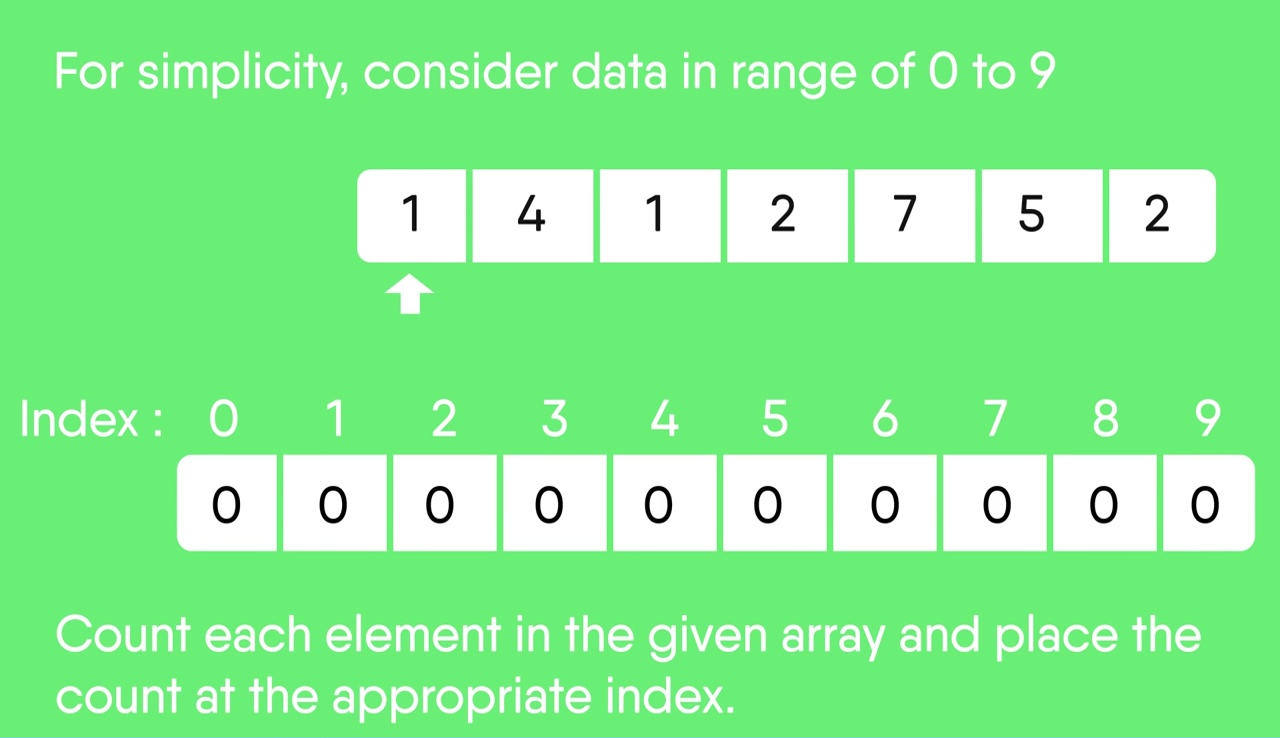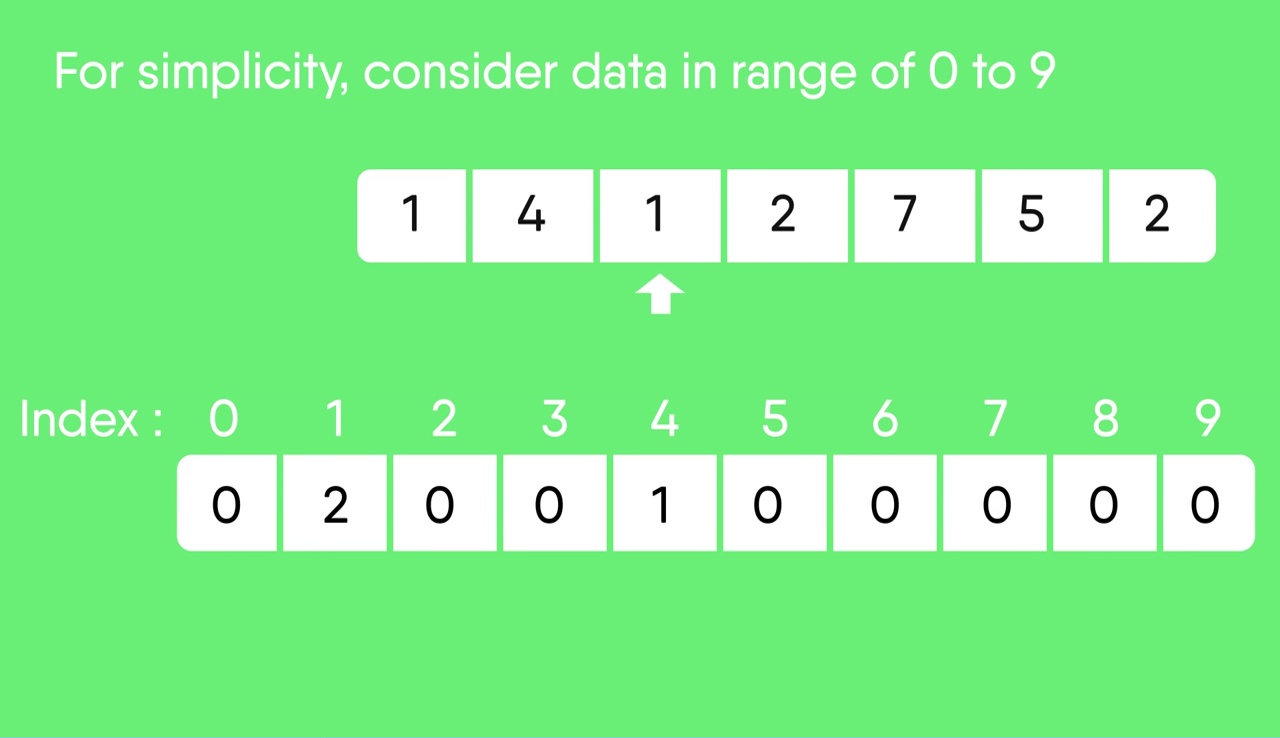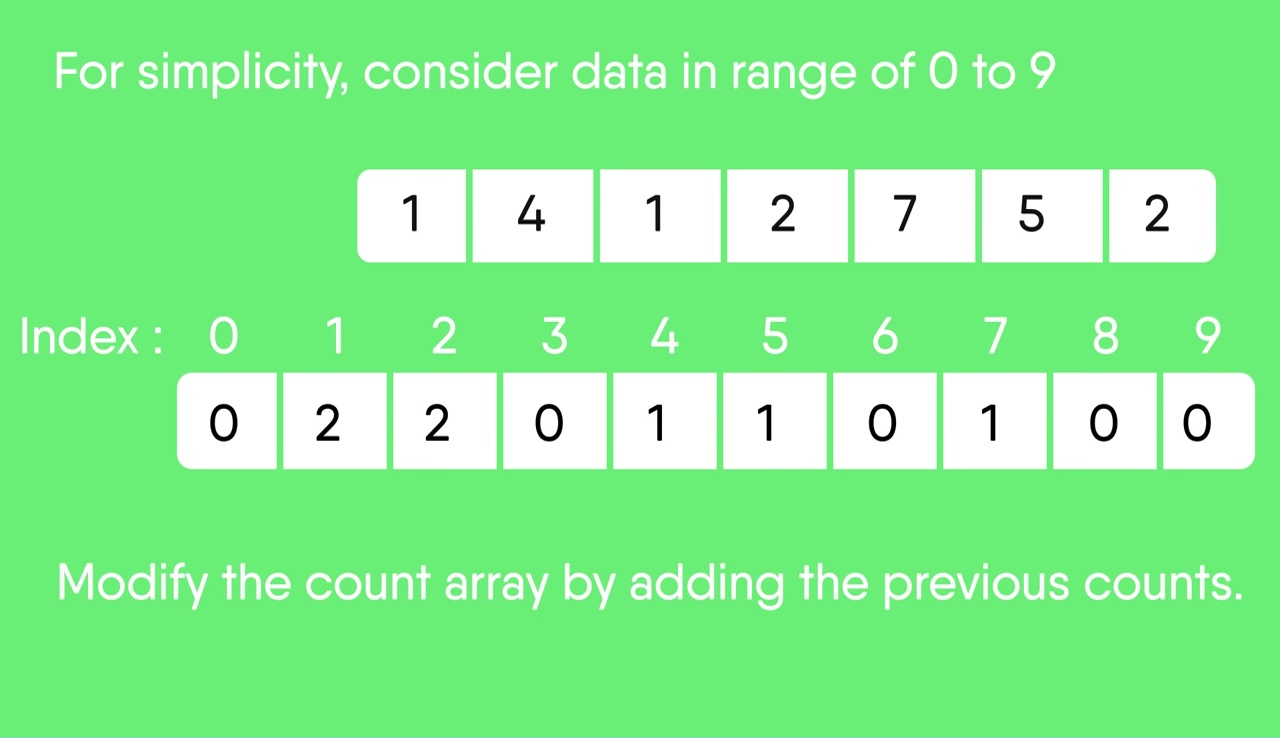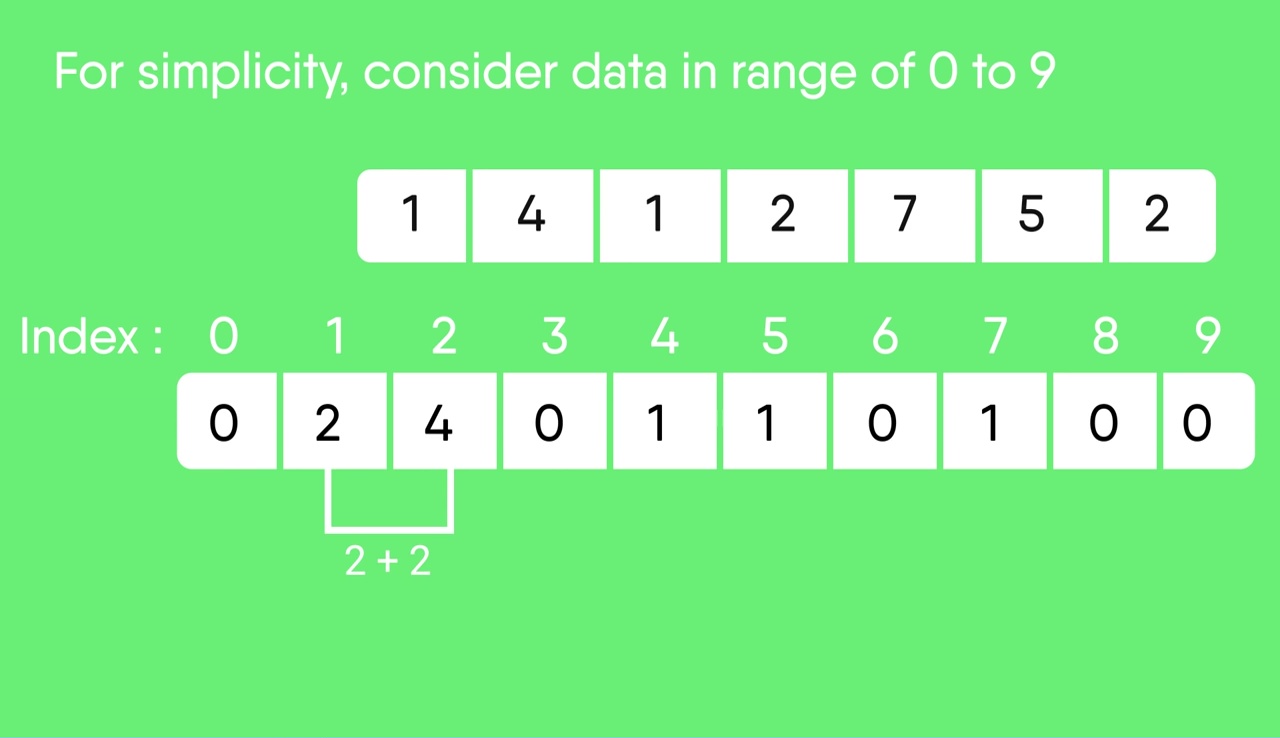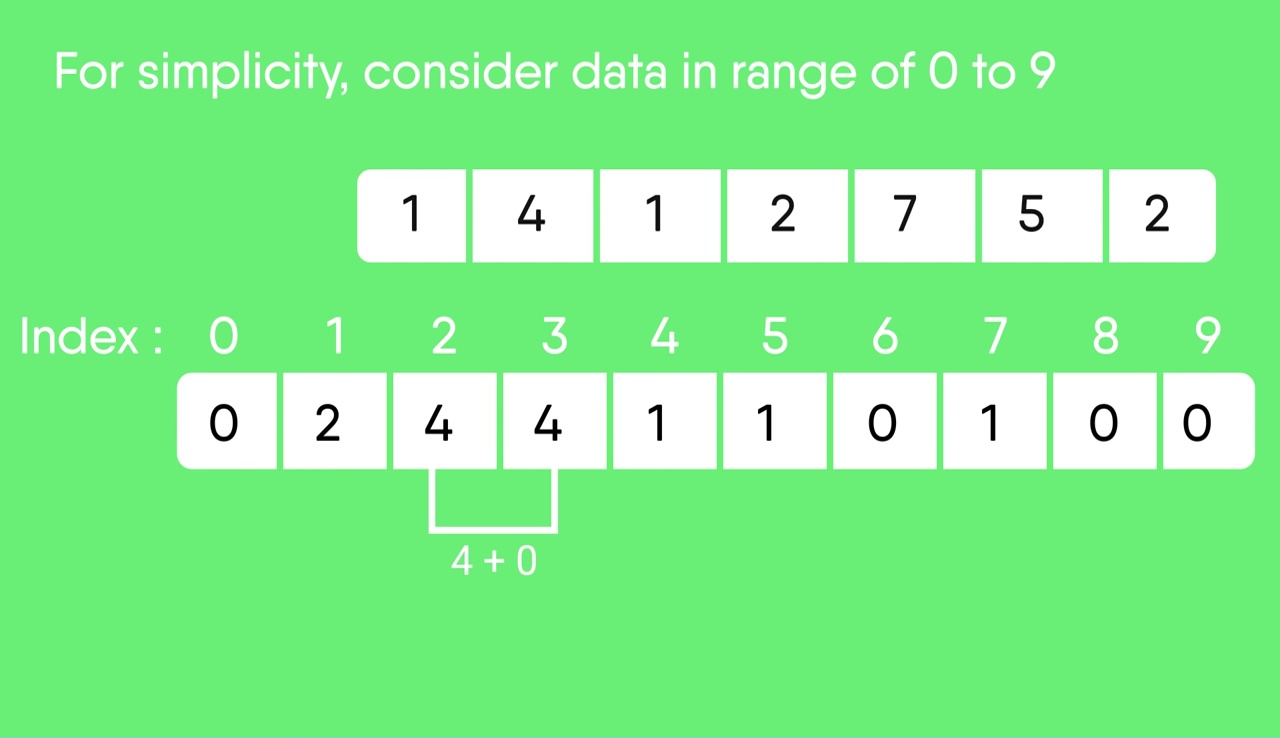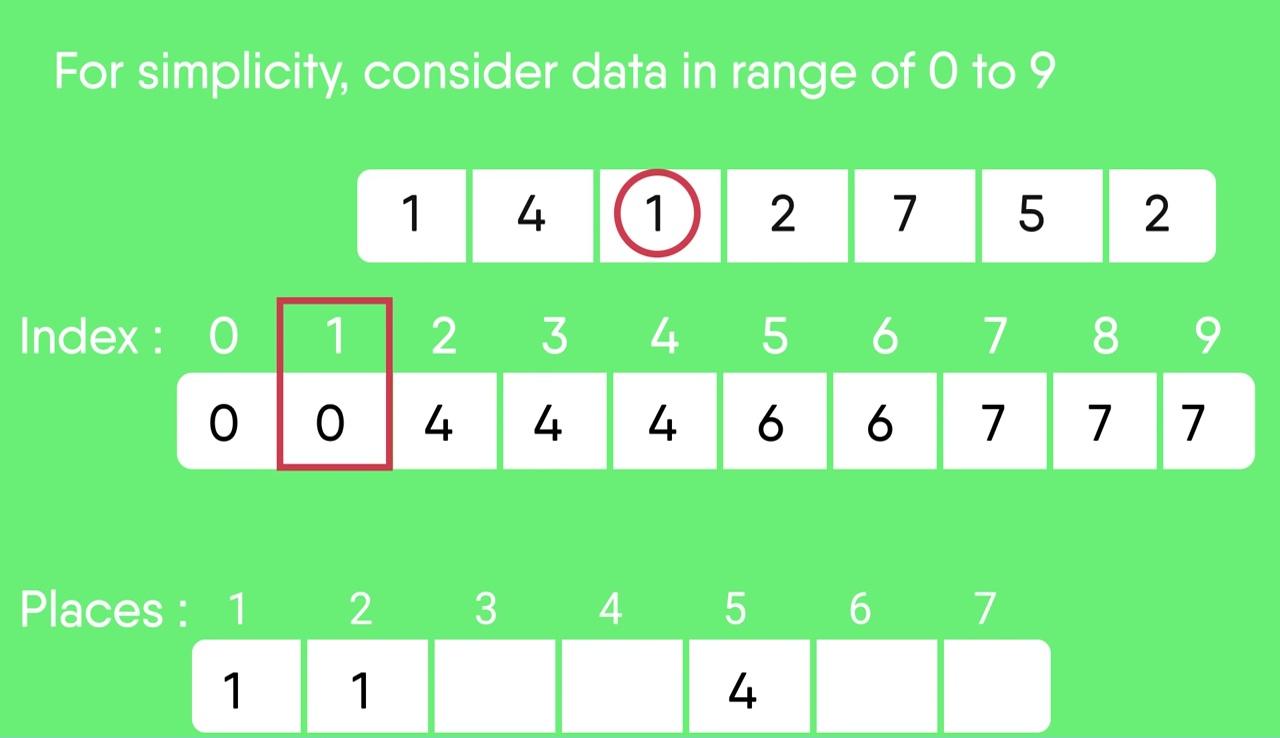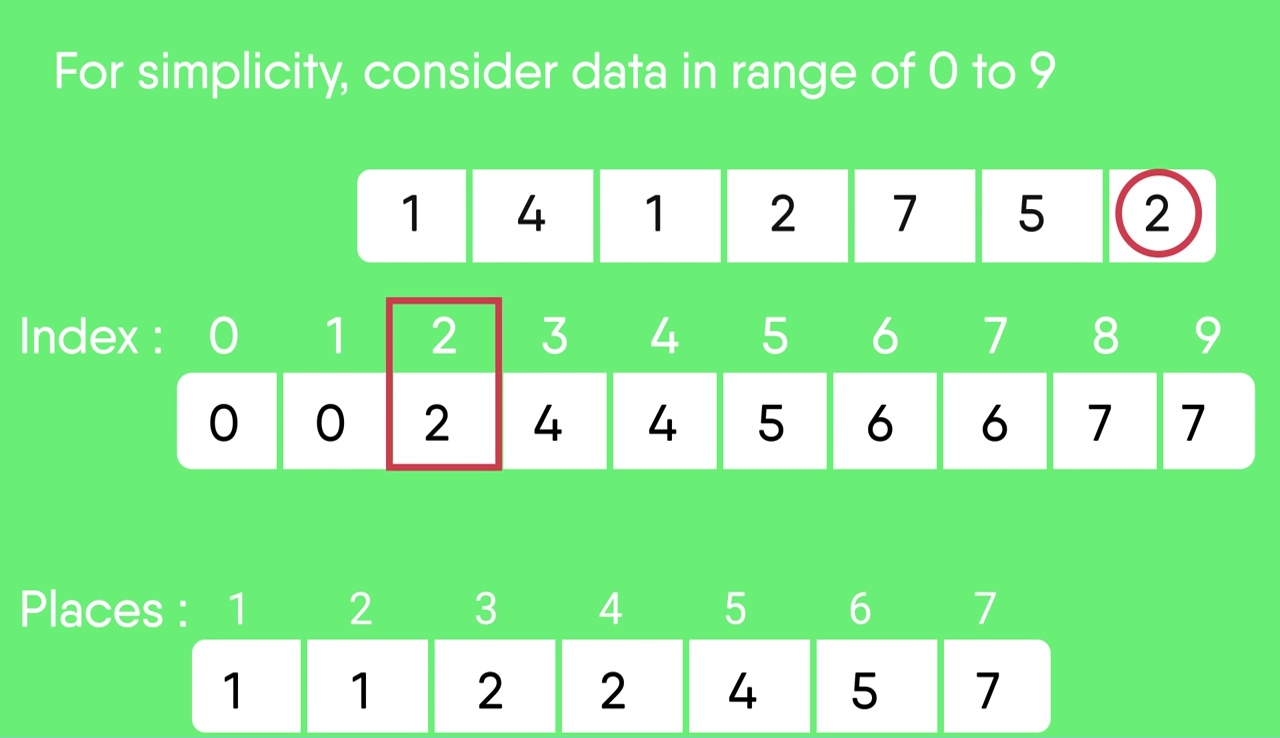计数排序是一种基于特定范围之间的键的排序技术。它通过计算具有不同键值(哈希类型)的对象的数量来工作。然后做一些算术计算每个对象在输出序列中的位置。
让我们借助一个示例来理解它。
For simplicity, consider the data in the range 0 to 9.
Input data: 1, 4, 1, 2, 7, 5, 2
1) Take a count array to store the count of each unique object.
Index: 0 1 2 3 4 5 6 7 8 9
Count: 0 2 2 0 1 1 0 1 0 0
2) Modify the count array such that each element at each index
stores the sum of previous counts.
Index: 0 1 2 3 4 5 6 7 8 9
Count: 0 2 4 4 5 6 6 7 7 7
The modified count array indicates the position of each object in
the output sequence.
3) Output each object from the input sequence followed by
decreasing its count by 1.
Process the input data: 1, 4, 1, 2, 7, 5, 2. Position of 1 is 2.
Put data 1 at index 2 in output. Decrease count by 1 to place
next data 1 at an index 1 smaller than this index.以下是计数排序的实现。
C++
// C++ Program for counting sort
#include
#include
using namespace std;
#define RANGE 255
// The main function that sort
// the given string arr[] in
// alphabetical order
void countSort(char arr[])
{
// The output character array
// that will have sorted arr
char output[strlen(arr)];
// Create a count array to store count of individual
// characters and initialize count array as 0
int count[RANGE + 1], i;
memset(count, 0, sizeof(count));
// Store count of each character
for (i = 0; arr[i]; ++i)
++count[arr[i]];
// Change count[i] so that count[i] now contains actual
// position of this character in output array
for (i = 1; i <= RANGE; ++i)
count[i] += count[i - 1];
// Build the output character array
for (i = 0; arr[i]; ++i) {
output[count[arr[i]] - 1] = arr[i];
--count[arr[i]];
}
/*
For Stable algorithm
for (i = sizeof(arr)-1; i>=0; --i)
{
output[count[arr[i]]-1] = arr[i];
--count[arr[i]];
}
For Logic : See implementation
*/
// Copy the output array to arr, so that arr now
// contains sorted characters
for (i = 0; arr[i]; ++i)
arr[i] = output[i];
}
// Driver code
int main()
{
char arr[] = "geeksforgeeks";
countSort(arr);
cout << "Sorted character array is " << arr;
return 0;
}
// This code is contributed by rathbhupendra C
// C Program for counting sort
#include
#include
#define RANGE 255
// The main function that sort the given string arr[] in
// alphabatical order
void countSort(char arr[])
{
// The output character array that will have sorted arr
char output[strlen(arr)];
// Create a count array to store count of inidividul
// characters and initialize count array as 0
int count[RANGE + 1], i;
memset(count, 0, sizeof(count));
// Store count of each character
for (i = 0; arr[i]; ++i)
++count[arr[i]];
// Change count[i] so that count[i] now contains actual
// position of this character in output array
for (i = 1; i <= RANGE; ++i)
count[i] += count[i - 1];
// Build the output character array
for (i = 0; arr[i]; ++i) {
output[count[arr[i]] - 1] = arr[i];
--count[arr[i]];
}
/*
For Stable algorithm
for (i = sizeof(arr)-1; i>=0; --i)
{
output[count[arr[i]]-1] = arr[i];
--count[arr[i]];
}
For Logic : See implementation
*/
// Copy the output array to arr, so that arr now
// contains sorted characters
for (i = 0; arr[i]; ++i)
arr[i] = output[i];
}
// Driver program to test above function
int main()
{
char arr[] = "geeksforgeeks"; //"applepp";
countSort(arr);
printf("Sorted character array is %sn", arr);
return 0;
} Java
// Java implementation of Counting Sort
class CountingSort {
void sort(char arr[])
{
int n = arr.length;
// The output character array that will have sorted arr
char output[] = new char[n];
// Create a count array to store count of inidividul
// characters and initialize count array as 0
int count[] = new int[256];
for (int i = 0; i < 256; ++i)
count[i] = 0;
// store count of each character
for (int i = 0; i < n; ++i)
++count[arr[i]];
// Change count[i] so that count[i] now contains actual
// position of this character in output array
for (int i = 1; i <= 255; ++i)
count[i] += count[i - 1];
// Build the output character array
// To make it stable we are operating in reverse order.
for (int i = n - 1; i >= 0; i--) {
output[count[arr[i]] - 1] = arr[i];
--count[arr[i]];
}
// Copy the output array to arr, so that arr now
// contains sorted characters
for (int i = 0; i < n; ++i)
arr[i] = output[i];
}
// Driver method
public static void main(String args[])
{
CountingSort ob = new CountingSort();
char arr[] = { 'g', 'e', 'e', 'k', 's', 'f', 'o',
'r', 'g', 'e', 'e', 'k', 's' };
ob.sort(arr);
System.out.print("Sorted character array is ");
for (int i = 0; i < arr.length; ++i)
System.out.print(arr[i]);
}
}
/*This code is contributed by Rajat Mishra */Python3
# Python program for counting sort
# The main function that sort the given string arr[] in
# alphabetical order
def countSort(arr):
# The output character array that will have sorted arr
output = [0 for i in range(len(arr))]
# Create a count array to store count of inidividul
# characters and initialize count array as 0
count = [0 for i in range(256)]
# For storing the resulting answer since the
# string is immutable
ans = ["" for _ in arr]
# Store count of each character
for i in arr:
count[ord(i)] += 1
# Change count[i] so that count[i] now contains actual
# position of this character in output array
for i in range(256):
count[i] += count[i-1]
# Build the output character array
for i in range(len(arr)):
output[count[ord(arr[i])]-1] = arr[i]
count[ord(arr[i])] -= 1
# Copy the output array to arr, so that arr now
# contains sorted characters
for i in range(len(arr)):
ans[i] = output[i]
return ans
# Driver program to test above function
arr = "geeksforgeeks"
ans = countSort(arr)
print("Sorted character array is % s" %("".join(ans)))
# This code is contributed by Nikhil Kumar SinghC#
// C# implementation of Counting Sort
using System;
class GFG {
static void countsort(char[] arr)
{
int n = arr.Length;
// The output character array that
// will have sorted arr
char[] output = new char[n];
// Create a count array to store
// count of inidividul characters
// and initialize count array as 0
int[] count = new int[256];
for (int i = 0; i < 256; ++i)
count[i] = 0;
// store count of each character
for (int i = 0; i < n; ++i)
++count[arr[i]];
// Change count[i] so that count[i]
// now contains actual position of
// this character in output array
for (int i = 1; i <= 255; ++i)
count[i] += count[i - 1];
// Build the output character array
// To make it stable we are operating in reverse order.
for (int i = n - 1; i >= 0; i--) {
output[count[arr[i]] - 1] = arr[i];
--count[arr[i]];
}
// Copy the output array to arr, so
// that arr now contains sorted
// characters
for (int i = 0; i < n; ++i)
arr[i] = output[i];
}
// Driver method
public static void Main()
{
char[] arr = { 'g', 'e', 'e', 'k', 's', 'f', 'o',
'r', 'g', 'e', 'e', 'k', 's' };
countsort(arr);
Console.Write("Sorted character array is ");
for (int i = 0; i < arr.Length; ++i)
Console.Write(arr[i]);
}
}
// This code is contributed by Sam007.PHP
= 0 ; $i--)
{
$output[$count[ord($arr[$i])] - 1] = $arr[$i];
--$count[ord($arr[$i])];
}
// Copy the output array to
// arr, so that arr now
// contains sorted characters
for ($i = 0; $i < $len; ++$i)
$arr[$i] = $output[$i];
return $arr;
}
// Driver Code
$arr = "geeksforgeeks"; //"applepp";
$arr = countSort($arr);
echo "Sorted character array is " . $arr;
// This code is contributed by mits
?>Javascript
Javas
criptC++
// Counting sort which takes negative numbers as well
#include
#include
#include
using namespace std;
void countSort(vector& arr)
{
int max = *max_element(arr.begin(), arr.end());
int min = *min_element(arr.begin(), arr.end());
int range = max - min + 1;
vector count(range), output(arr.size());
for (int i = 0; i < arr.size(); i++)
count[arr[i] - min]++;
for (int i = 1; i < count.size(); i++)
count[i] += count[i - 1];
for (int i = arr.size() - 1; i >= 0; i--) {
output[count[arr[i] - min] - 1] = arr[i];
count[arr[i] - min]--;
}
for (int i = 0; i < arr.size(); i++)
arr[i] = output[i];
}
void printArray(vector& arr)
{
for (int i = 0; i < arr.size(); i++)
cout << arr[i] << " ";
cout << "\n";
}
int main()
{
vector arr = { -5, -10, 0, -3, 8, 5, -1, 10 };
countSort(arr);
printArray(arr);
return 0;
} Java
// Counting sort which takes negative numbers as well
import java.util.*;
class GFG {
static void countSort(int[] arr)
{
int max = Arrays.stream(arr).max().getAsInt();
int min = Arrays.stream(arr).min().getAsInt();
int range = max - min + 1;
int count[] = new int[range];
int output[] = new int[arr.length];
for (int i = 0; i < arr.length; i++) {
count[arr[i] - min]++;
}
for (int i = 1; i < count.length; i++) {
count[i] += count[i - 1];
}
for (int i = arr.length - 1; i >= 0; i--) {
output[count[arr[i] - min] - 1] = arr[i];
count[arr[i] - min]--;
}
for (int i = 0; i < arr.length; i++) {
arr[i] = output[i];
}
}
static void printArray(int[] arr)
{
for (int i = 0; i < arr.length; i++) {
System.out.print(arr[i] + " ");
}
System.out.println("");
}
// Driver code
public static void main(String[] args)
{
int[] arr = { -5, -10, 0, -3, 8, 5, -1, 10 };
countSort(arr);
printArray(arr);
}
}
// This code is contributed by princiRaj1992Python3
# Python program for counting sort
# which takes negative numbers as well
# The function that sorts the given arr[]
def count_sort(arr):
max_element = int(max(arr))
min_element = int(min(arr))
range_of_elements = max_element - min_element + 1
# Create a count array to store count of individual
# elements and initialize count array as 0
count_arr = [0 for _ in range(range_of_elements)]
output_arr = [0 for _ in range(len(arr))]
# Store count of each character
for i in range(0, len(arr)):
count_arr[arr[i]-min_element] += 1
# Change count_arr[i] so that count_arr[i] now contains actual
# position of this element in output array
for i in range(1, len(count_arr)):
count_arr[i] += count_arr[i-1]
# Build the output character array
for i in range(len(arr)-1, -1, -1):
output_arr[count_arr[arr[i] - min_element] - 1] = arr[i]
count_arr[arr[i] - min_element] -= 1
# Copy the output array to arr, so that arr now
# contains sorted characters
for i in range(0, len(arr)):
arr[i] = output_arr[i]
return arr
# Driver program to test above function
arr = [-5, -10, 0, -3, 8, 5, -1, 10]
ans = count_sort(arr)
print("Sorted character array is " + str(ans))C#
// Counting sort which takes negative numbers as well
using System;
using System.Collections.Generic;
using System.Linq;
class GFG
{
static void countSort(int[] arr)
{
int max = arr.Max();
int min = arr.Min();
int range = max - min + 1;
int []count = new int[range];
int []output = new int[arr.Length];
for (int i = 0; i < arr.Length; i++) {
count[arr[i] - min]++;
}
for (int i = 1; i < count.Length; i++) {
count[i] += count[i - 1];
}
for (int i = arr.Length - 1; i >= 0; i--) {
output[count[arr[i] - min] - 1] = arr[i];
count[arr[i] - min]--;
}
for (int i = 0; i < arr.Length; i++) {
arr[i] = output[i];
}
}
static void printArray(int[] arr)
{
for (int i = 0; i < arr.Length; i++)
{
Console.Write(arr[i] + " ");
}
Console.WriteLine("");
}
// Driver code
public static void Main(string[] args)
{
int[] arr = { -5, -10, 0, -3, 8, 5, -1, 10 };
countSort(arr);
printArray(arr);
}
}
// This code is contributed by rutvik_56.Javascript
输出:
Sorted character array is eeeefggkkorss时间复杂度: O(n + k),其中n是输入数组中元素的数量,k是输入范围。
辅助空间: O(n + k)
先前的计数排序的问题在于,如果其中包含负数,则无法对元素进行排序。因为没有负数组索引。所以我们要做的是,找到最小元素,并将该最小元素的计数存储在零索引处。
C++
// Counting sort which takes negative numbers as well
#include
#include
#include
using namespace std;
void countSort(vector& arr)
{
int max = *max_element(arr.begin(), arr.end());
int min = *min_element(arr.begin(), arr.end());
int range = max - min + 1;
vector count(range), output(arr.size());
for (int i = 0; i < arr.size(); i++)
count[arr[i] - min]++;
for (int i = 1; i < count.size(); i++)
count[i] += count[i - 1];
for (int i = arr.size() - 1; i >= 0; i--) {
output[count[arr[i] - min] - 1] = arr[i];
count[arr[i] - min]--;
}
for (int i = 0; i < arr.size(); i++)
arr[i] = output[i];
}
void printArray(vector& arr)
{
for (int i = 0; i < arr.size(); i++)
cout << arr[i] << " ";
cout << "\n";
}
int main()
{
vector arr = { -5, -10, 0, -3, 8, 5, -1, 10 };
countSort(arr);
printArray(arr);
return 0;
}
Java
// Counting sort which takes negative numbers as well
import java.util.*;
class GFG {
static void countSort(int[] arr)
{
int max = Arrays.stream(arr).max().getAsInt();
int min = Arrays.stream(arr).min().getAsInt();
int range = max - min + 1;
int count[] = new int[range];
int output[] = new int[arr.length];
for (int i = 0; i < arr.length; i++) {
count[arr[i] - min]++;
}
for (int i = 1; i < count.length; i++) {
count[i] += count[i - 1];
}
for (int i = arr.length - 1; i >= 0; i--) {
output[count[arr[i] - min] - 1] = arr[i];
count[arr[i] - min]--;
}
for (int i = 0; i < arr.length; i++) {
arr[i] = output[i];
}
}
static void printArray(int[] arr)
{
for (int i = 0; i < arr.length; i++) {
System.out.print(arr[i] + " ");
}
System.out.println("");
}
// Driver code
public static void main(String[] args)
{
int[] arr = { -5, -10, 0, -3, 8, 5, -1, 10 };
countSort(arr);
printArray(arr);
}
}
// This code is contributed by princiRaj1992
Python3
# Python program for counting sort
# which takes negative numbers as well
# The function that sorts the given arr[]
def count_sort(arr):
max_element = int(max(arr))
min_element = int(min(arr))
range_of_elements = max_element - min_element + 1
# Create a count array to store count of individual
# elements and initialize count array as 0
count_arr = [0 for _ in range(range_of_elements)]
output_arr = [0 for _ in range(len(arr))]
# Store count of each character
for i in range(0, len(arr)):
count_arr[arr[i]-min_element] += 1
# Change count_arr[i] so that count_arr[i] now contains actual
# position of this element in output array
for i in range(1, len(count_arr)):
count_arr[i] += count_arr[i-1]
# Build the output character array
for i in range(len(arr)-1, -1, -1):
output_arr[count_arr[arr[i] - min_element] - 1] = arr[i]
count_arr[arr[i] - min_element] -= 1
# Copy the output array to arr, so that arr now
# contains sorted characters
for i in range(0, len(arr)):
arr[i] = output_arr[i]
return arr
# Driver program to test above function
arr = [-5, -10, 0, -3, 8, 5, -1, 10]
ans = count_sort(arr)
print("Sorted character array is " + str(ans))
C#
// Counting sort which takes negative numbers as well
using System;
using System.Collections.Generic;
using System.Linq;
class GFG
{
static void countSort(int[] arr)
{
int max = arr.Max();
int min = arr.Min();
int range = max - min + 1;
int []count = new int[range];
int []output = new int[arr.Length];
for (int i = 0; i < arr.Length; i++) {
count[arr[i] - min]++;
}
for (int i = 1; i < count.Length; i++) {
count[i] += count[i - 1];
}
for (int i = arr.Length - 1; i >= 0; i--) {
output[count[arr[i] - min] - 1] = arr[i];
count[arr[i] - min]--;
}
for (int i = 0; i < arr.Length; i++) {
arr[i] = output[i];
}
}
static void printArray(int[] arr)
{
for (int i = 0; i < arr.Length; i++)
{
Console.Write(arr[i] + " ");
}
Console.WriteLine("");
}
// Driver code
public static void Main(string[] args)
{
int[] arr = { -5, -10, 0, -3, 8, 5, -1, 10 };
countSort(arr);
printArray(arr);
}
}
// This code is contributed by rutvik_56.
Java脚本
输出:
-10 -5 -3 -1 0 5 8 10 注意事项:
1.如果输入数据的范围不明显大于要排序的对象数,则计数排序是有效的。考虑以下情况:输入序列在1到10K范围之间,数据为10、5、10K,5K。
2.这不是基于比较的排序。它的运行时间复杂度为O(n),其空间与数据范围成正比。
3.它通常用作另一个排序算法(例如基数排序)的子例程。
4.计数排序使用部分散列来计数O(1)中数据对象的出现。
5.计数排序可以扩展为也适用于负输入。
锻炼:
1.修改上面的代码以对输入数据进行排序,范围从M到N。
2.计数排序稳定且在线吗?
3.关于并行化计数排序算法的思考。
快照:
